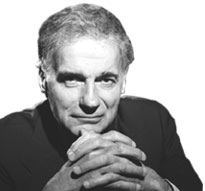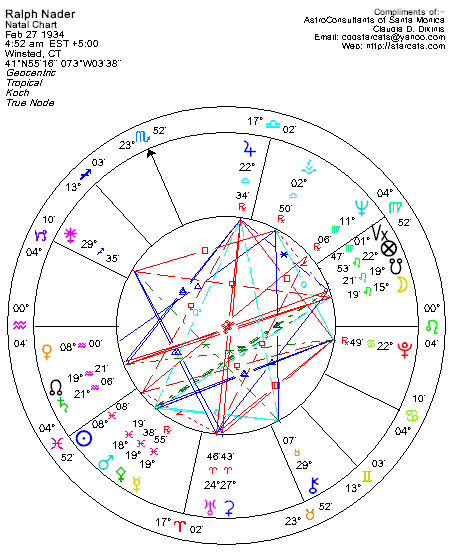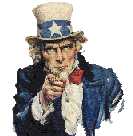Election 2004
Ralph Nader


 Nader birth data courtesy of Astrodatabank
Nader birth data courtesy of Astrodatabank
Who is Ralph Nader?
Ralph Nader, born in 1934, was taught by his parents that social activism was a civic duty. He was influenced by a number of investigative journalists known as muckrakers who described graphically how corporate power could corrupt government and create in the early 1900s miserable working and living conditions harmful for ordinary people. (For example, Upton Sinclair's exposé of the meat industry, The Jungle.) After his graduation magna cum laude from Princeton and, while still at Harvard Law School, he targeted a modern realm of unchecked corporate power and abuse: the engineering design of automobiles. Despite horrific vehicular fatalities and injuries and the capacity of the auto industry to engineer and market safer cars, corporate managers opted to flood the market with dangerous vehicles while government stood silent. As Nader put it in 1959:
“It is clear Detroit today is designing automobiles for style, performance and calculated obsolescence, but not—despite the 5,000,000 reported accidents, nearly 40,000 fatalities, 110,000 permanent disabilities and 1,500,000 injuries yearly—for safety.”
His 1965 book, Unsafe at Any Speed: The Designed-In Dangers of the American Automobile, caused a public furor equal to muckraker books like The Jungle. When General Motors tried to discredit him, he sued for invasion of privacy. A Senate committee forced a public apology from GM's president. New auto safety laws and a legal settlement followed.
Nader used the settlement money to found the modern consumer movement. With his Nader's Raiders, he began a decades-long, successful fight against corporate bosses and their proxies in government for the wellbeing of all Americans.
Investigations by the Raiders, followed by aggressive lobbying, prompted a range of new laws dealing with safety in coal mines, sanitation in the food industry, and dangers in natural gas transport to name but a few. Raiders examined and documented abuses within the Federal Trade Commission, the Interstate Commerce Commission and the Food and Drug Administration, all federal agencies created in other eras to protect consumers. These investigations led to Congressional review and reforms.
Consumers get better information about food, drugs, the terms of loans, the energy efficiency of appliances and the crashworthiness of cars thanks to Nader's initiatives. New tools were achieved for citizen activists like the Freedom of Information Act and “sunshine laws” for more open government at both the federal and state legislative levels. He fought for broadened access to the civil justice system. Nader saw public interest litigation, courts and jurors as crucial instruments for taking on big business, compensating the injured and ferreting out governmental wrongdoing.
Nader’s organizations have been responsible for federal consumer protection laws such as the Safe Drinking Water Act. They led in getting Congress and the White House to establish federal regulatory agencies such as the National Highway and Traffic Safety Administration, the Occupational Safety and Health Administration (OSHA), Environment Protection Agency (EPA), and Consumer Product Safety Commission, among others. They’ve caused the recall of millions of defective motor vehicles and other consumer products like hazardous medicines and contaminated food.
Other groups he inspired include the Aviation Consumer Action Project, Center for Auto Safety, Clean Water Action Project, Disability Rights Center, Pension Rights Center, Freedom of Information Clearinghouse, and the Congressional Accountability Project. Nader started the movement known as the Public Interest Research Groups (PIRGs), the successful organizations funded and controlled by students that function on college campuses and communities in more than 23 states.
In 1971, Nader founded Public Citizen, to be the consumers’ eyes and ears in Washington, working for consumer justice and government and corporate accountability. More than 150,000 people are now supporting the six branches of Public Citizen: Congress Watch, Health Research Group, Litigation Group, Critical Mass Energy Project, Global Trade Watch and Buyers Up, Each group uses a combination of volunteer help and technical expertise to protect Americans from abusive government and corporate power. Mr. Nader turned over the helm of Public Citizen in 1981 to other leaders.
New citizen action groups link the threats and promises of the new technology to grassroots movements. Still others teach through example the same principles of civic responsibility that Ralph Nader learned at his parents' kitchen table. These groups include the Consumer Project on Technology, Citizen Works and Democracy Rising. Nader started the globally-circulated magazine, Multinational Monitor. It reports the abuses of multinational corporations and the struggles of peoples against them.
Nader's legacy to America and the world could be measured by the millions of lives he has improved and saved by his lifelong efforts and by the dozens of civic organizations he has started and the many citizens he has inspired to create their own justice and institutions in their communities here and abroad. Time Magazine named him one of the hundred most significant persons of the Twentieth Century. In 2000 Nader ran for President as nominee of the Green Party. He received nearly 3 percent of the popular vote in an electoral system that is rigged against third parties in so many ways from ballot access to the debates.
** This biographical information is provided solely as a means to help people unfamiliar with Ralph Nader ascertain whether or not he should consider running for President in 2004. Ralph Nader Exploratory Committee
|






